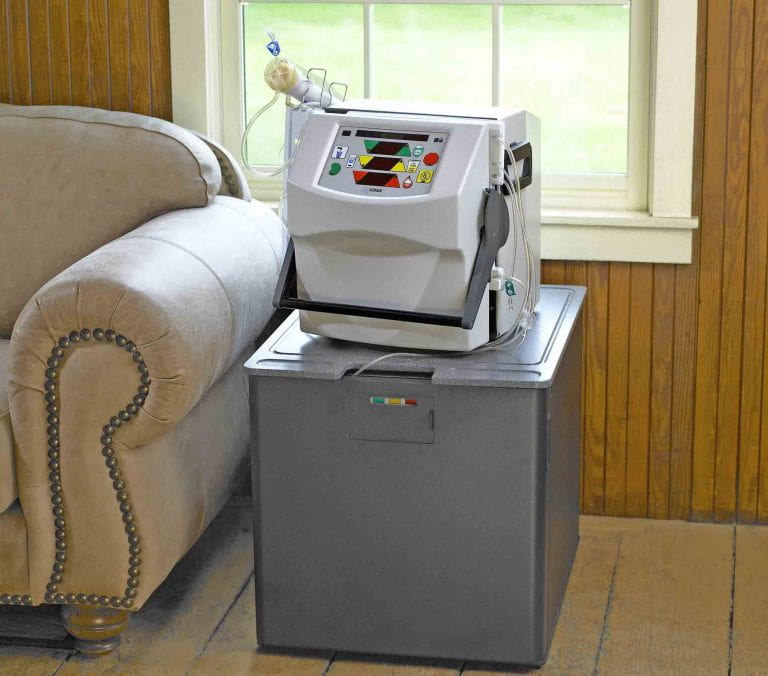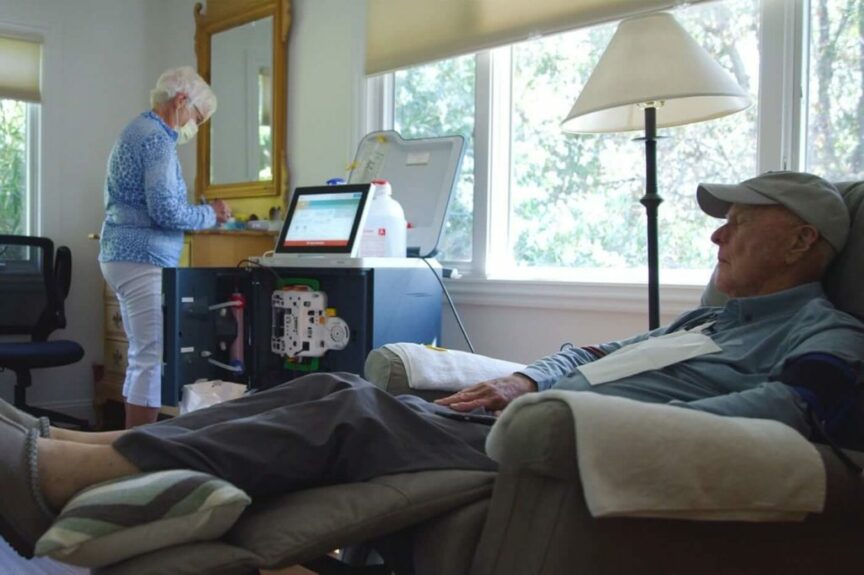Home hemodialysis (HHD) offers the convenience of receiving hemodialysis treatment in the comfort of your own home, using equipment that is slightly different from what is used in a traditional in-center setting. During hemodialysis, your blood is filtered outside of your body through a device known as a dialyzer or “artificial kidney”. This dialyzer, with the help of a solution called dialysate, effectively eliminates unwanted waste, toxins, and excess fluids from your bloodstream, ensuring that clean and chemically balanced blood is returned to your body.
One notable advantage of HHD is the ability to undergo treatment more frequently compared to in-center hemodialysis, which can potentially lead to improved outcomes for certain patients. However, the main distinction between HHD and in-center hemodialysis lies in the responsibility placed on you and your designated care partner. In HHD, you and your care partner oversee setting up your treatment, operating the equipment, managing the cleanup process, and properly disposing of used supplies.
It is crucial to make the decision regarding the type of dialysis treatment in consultation with a healthcare professional. They possess the expertise to provide personalized recommendations based on your specific medical needs, ensuring that you receive the most suitable and effective treatment option for you.
References/Trusted links:
https://en.wikipedia.org/wiki/Home_hemodialysis
https://www.renalandurologynews.com/home/news/nephrology/hemodialysis/home-hemodialysis-hhd-has-benefits-disadvantages/
https://www.freseniuskidneycare.com/treatment/home-hemodialysis
https://www.kidney.org/atoz/content/homehemo
https://www.davita.com/treatment-services/home-hemodialysis/a-brief-overview
Is It Safe?
HHD is considered a safe replacement for in-center hemodialysis. The potential for serious adverse events exists when patients perform hemodialysis in their homes without supervision. Therefore, most dialysis centers will require you to have a care partner to be present and available to assist you during your treatments. Your dialysis center will train you and your care partner on everything you need to know about the entire hemodialysis treatment processes before you start HHD in your home. Therefore, it is important to work closely with your healthcare team to ensure that you and your care partner are trained and equipped to manage your home hemodialysis treatments safely.
References/Trusted links:
https://blog.renaltracker.com/chronic-kidney-disease-101/at-home-dialysis-treatment-family-as-informal-caregivers/
https://pubmed.ncbi.nlm.nih.gov/33609415/
https://onlinelibrary.wiley.com/doi/10.1111/hdi.12248
https://www.kidney.org/atoz/content/homehemo

The NxStage System One portable hemodialysis system
How does it compare to in-center hemodialysis?
HHD has many advantages over in-center hemodialysis. A few of these advantages include: the convenience of doing treatments around your schedule, giving you more independence; having more control over your own treatment; and being in the comfort and privacy of your own home. However, HHD might not be a good fit for everyone. In-center hemodialysis has the advantage of being performed by trained healthcare professionals who can monitor you during treatment and respond quickly if there are any problems. In addition, you can socialize with other patients during treatment. Discussing your individual needs and preferences with your healthcare team will help you choose which type of dialysis treatment is right for you.
References/Trusted links:
https://www.ncbi.nlm.nih.gov/books/NBK344417/
https://www.kidney.org/content/considering-center-versus-home-dialysis
How Does the Cost of HHD Compare with In-Center Hemodialysis?
According to a systematic literature review from 2000-2014, home hemodialysis (including short daily and nocturnal) is more cost-effective than in-center hemodialysis. Although home hemodialysis has higher start-up costs, these costs are recouped over the long term while in-center hemodialysis has higher staff costs.
The cost of dialysis can vary depending on many factors such as insurance coverage, location, and type of dialysis. A discussion with your healthcare team and insurance provider will help you to determine what your own costs will be.
References/Trusted links:
Cost of in-center vs. home HD – Journal Watch – Home Dialysis Central
https://pubmed.ncbi.nlm.nih.gov/24750559/
https://www.freseniuskidneycare.com/thrive-central/considering-home-dialysis-cost
Is Travel with HHD Okay?
Yes, it is possible to travel with home hemodialysis. However, it requires planning and coordination with your healthcare team.
Here are some tips to help you prepare for your trip:
- Contact your healthcare team: Before you travel, talk to your healthcare team about your travel plans. They can help you plan your dialysis treatments and provide you with the necessary supplies for your trip.
- Find a dialysis center: If you are traveling within the United States, you can use the Dialysis Facility Compare tool on the Medicare website to find a dialysis center near your destination. If you are traveling outside of the United States, contact your insurance provider to find out if they have any preferred dialysis centers in the area.
- Pack extra supplies: Make sure to pack extra supplies for your dialysis treatments, including dialysate solution, tubing, needles, and other supplies. You should also pack extra medications in case of an emergency.
- Check with your insurance provider: Before you travel, check with your insurance provider to ensure that you have coverage for dialysis treatments while traveling.
- Plan for emergencies: Make sure to have a plan in place in case of an emergency. This may include identifying local hospitals or medical facilities that can provide emergency care.
References/Trusted links:
https://www.kidney.org/atoz/content/traveltip
Travel Tips PDF
Statistics
There are numerous studies that suggest HHD has overall better outcomes for patients than in-center hemodialysis over the long term. According to the National Kidney Foundation, patients who use short daily or nocturnal HHD use fewer medications for things like controlling blood pressure, phosphorus levels, and anemia. They also report sleeping better, feeling better during and after dialysis, and having more energy.
In the Annual Data Report from the 2022 United States Renal Data System, 82.9% of patients who do HHD were prescribed between 4 to 5.9 treatments a week, with 44.4% who needed less than 3 hours of treatment per session, and 36.1% did treatment for less than 12 hours a week.
References/Trusted links:
https://usrds-adr.niddk.nih.gov/2022/end-stage-renal-disease
https://www.kidney.org/atoz/content/homehemo
https://pubmed.ncbi.nlm.nih.gov/22362906/
https://www.ncbi.nlm.nih.gov/pmc/articles/PMC6628511/
Worldwide use?
HHD is used worldwide, but the utilization rate varies by country. Some countries, like New Zealand, have up to 18% of hemodialysis patients on HHD, while others like Canada trail behind at 3-6%, and even some western European countries have 3% or less. The UK’s National Institute of Health and Care Excellence has set a goal of 15% for HHD, and this has caused growth in the overall percentage of patients doing HHD for the past 10 years.
Reference/Trusted link:
Home hemodialysis: a comprehensive review of patient-centered and economic considerations – PMC (nih.gov)
Additional trusted links:
Introduction to Home Hemodialysis – YouTube
How to Setup the NxStage System One – YouTube
https://www.youtube.com/watch?v=YTq52j9ViSk
New generation of dialysis machines to allow more patients to dialyze at home. – YouTube
